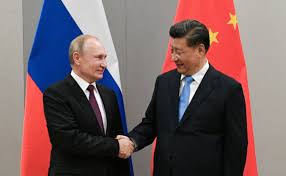Opinion: India Can’t Wish Away the Growing Russia-China Bonhomie

22.05.2024: As the global order continues to evolve, key players are reconfiguring their policies in response. The West faces internal challenges as domestic aspirations shift under global pressures, causing the balance of power to remain in flux. While China is viewed by the West and the US as the most significant long-term challenge, the Ukraine war has shifted Western efforts and resources to managing a crisis on the European periphery. Russia has re-emerged as a significant threat in the consciousness of European policymakers.
The Strengthening Russia-China Alliance
With the West confronting Russia and China simultaneously, the relationship between Beijing and Moscow has steadily transformed. This shift was highlighted during Russian President Vladimir Putin’s recent visit to China, marked by a 7,000-word joint statement emphasizing the strength and stability of Russian-Chinese relations. Putin’s choice of China for his first overseas trip since his recent re-election underscores Moscow’s growing reliance on Beijing, especially since the Ukraine crisis.
The ‘No Limits’ Partnership
This visit came shortly after US Secretary of State Antony Blinken warned China about its support for Russia. Despite these warnings, China continues to bolster Russia’s defense capabilities, which has helped Russia sustain its aggression against Ukraine. This ongoing support is a significant concern for Western capitals.
Putin and Xi Jinping’s proclamation of a “no limits” partnership during the Winter Olympics in Beijing, just weeks before Russia’s invasion of Ukraine, set the stage for this deepening alliance. Although China claims neutrality in the Ukraine conflict, it has used the situation to strengthen its economic, strategic, and diplomatic ties with Russia. During Putin’s visit, both nations committed to enhancing military cooperation, including joint exercises and patrols.
China Takes the Lead
The relationship between Russia and China has evolved significantly since the onset of the Ukraine war. Despite China’s claims of neutrality, trade between the two nations has surged, with China becoming a crucial market for Russian energy exports amidst Western sanctions. Military and defense ties have also grown.
However, this partnership now sees China in the dominant position. The protracted war in Ukraine has imposed severe costs on Russia, exposing weaknesses in its military and economy. While Russia is increasingly cut off from the West, China is looking to rebalance its own economy. Putin is seeking Chinese assistance in financing the war, praising his relationship with Xi as “close as brothers” and lauding China’s economic progress.
Xi Jinping, however, was more cautious in his remarks, and no significant deals were signed during the visit. The visit’s pomp and circumstance were meant to signal Beijing’s defiance and cautious embrace of a leader shunned by the West. This partnership, driven by shared geopolitical interests, aims to reshape the global order and has significant implications for international politics.
Implications for India
For New Delhi, managing the Russia-China axis will be a significant foreign policy challenge. This alliance fundamentally alters India’s strategic outlook. India’s reliance on Russian military hardware could be affected by closer Sino-Russian ties, potentially limiting access to advanced technologies or altering military support dynamics. Additionally, as Russia pivots towards China for energy exports, India may face increased competition for Russian oil and gas, impacting prices and supply stability.
A strengthened Sino-Russian economic collaboration might also sideline India in regional infrastructure projects and trade routes. This partnership could reduce Indian influence in regional forums like the Shanghai Cooperation Organization (SCO) and BRICS. Navigating this seemingly multipolar world will test New Delhi’s foreign policy, necessitating a careful balance between major powers while safeguarding national interests.

